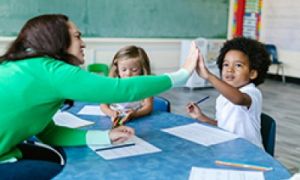When children are confident, it means they can recognise the things they are good at and are happy to try out new things. Confidence is so important that it forms part of two learning outcomes in the EYLF Outcome 1.3: “Children develop knowledgeable and confident self-identities” as well as Outcome 4: “Children are confident and involved learners”. The following article provides strategies that Educators can use to build confidence in children so that they can achieve the best life and learning outcomes.
Build Secure Relationships
Feeling loved and accepted without preconditions is the foundation for building confidence. So work at nurturing secure attachments with babies and toddlers as well as trusting relationships with children. Knowing that they will always be loved, whether they fail or succeed, will give them the emotional strength to explore new experiences, succeed and feel good about themselves.
Ensure Age-appropriate Tasks
Confidence grows with the successful completion of tasks so it is extremely important for educators to calibrate activities according to the abilities and developmental stage of children. Thus if a child is given a task that is beyond their fine motor or cognitive abilities at that age group, they are likely to fail and lose confidence. For example, telling toddlers to write well-formed letters or tie shoelaces is inappropriate; instead, they can be told to build blocks or colour big shapes. Even when introducing new, slightly more challenging experiences, ensure that goals are achievable by breaking down large tasks or responsibilities into small steps.
Nurture Their Self-esteem
Though the two are linked, self-esteem and confidence are not identical. While confidence is the ability to explore and do things without feeling doubtful, self-esteem is feeling positive about and fully accepting one’s own self. Use stories, music, dance, physical games and varied activities to convey the message that each child is unique. Though they may have different skin colours, bodies, home languages, skills, abilities and styles, each one of them has something worthy to celebrate. This will help children to avoid getting caught up on what somebody else has – and they don’t – and instead, focus on what they have and can be. Again be alert to some types of socio-cultural messages which see asking for help as a kind of failure. Children should know that asking for help if they need it is a desirable skill and actually shows the strength of selfhood.
Appreciate Effort More Than Achievement
Children are naturally curious and driven to explore their world. it is only when their significant adults keep noticing and praising just the achievements – which can be anything from successfully tying shoelaces to doing a math sum – that children get the message that success is all that matters. Such an understanding is the surest way to lose confidence since children start dreading failure and therefore avoid new activities and experiences. They worry that failing at something would not only not get a smile out of a loved adult, but worse, perhaps result in a frown. What families and educators need to do instead is to notice and praise significant efforts, like, “Wow you worked really hard to build that big tower” or “What a lovely show– did you and your friend have fun singing and dancing together?” Praise that’s specific and acknowledges the processes of completing an activity or solving a problem not only develops children's motivation but also teaches them what they're doing well.
Avoid Doing It For Them
Since significant adults like parents and educators hold the duty of care above any instructional roles, they usually cease to realise how they are doing for children. So, hold back for a moment to consider if the child is physically capable of wearing their jacket, opening their lunch box and carrying the sand pail - if they can, let them do things for themselves. According to Erikson’s psychosocial theory of development, at around two years children are driven towards autonomy to exert control over their own bodies and actions; if this drive is thwarted, they not only become doubtful of their own abilities but can even become guilt-ridden while watching other children of their age complete those same tasks.
Address Failure
Teaching children how to handle failure is an essential aspect of building their confidence. Whether a toddler is trying to open a box or a young child is learning to copy letter forms, there are bound to be setbacks along the way. Instead of jumping in and showing them how to do it or letting them win at a game every time, take a step back and allow children to falter occasionally. This conveys the message that such stumbles are a normal part of any learning journey. At the same time, let children know that you are not abandoning them; practice reflective listening and empathetic response to show them you know how it feels to not have succeeded; work together on problem-solving skills to focus on what the children can change, instead of thinking that the situation is beyond help or that there’s something wrong with them. Above all, children need the reassurance that you will be around to offer support and encouragement should they feel confident to try again.
Be Kind To Yourself
It is as much important to have patience with yourself as with children as they are trying new things and experiences. Their – just like our own – first tries are unlikely to be successful. That neither means they are poor learners nor that you are a bad teacher. Things take practice and if you unconsciously get anxious about children not being able to do things – like a sorting activity or post-art hour clean-up – then it is quite likely that your learners will pick up your emotional cues and feel even less sure about themselves than before. They may not have the language to express themselves, but children can feel the tension in their environment. so accept that everyone needs time to get better at doing this; there is no race being run and that each child deserves to learn at their own pace.
Include A Balance Of Activities
Let children work on a mix of close- and open-ended activities over the day. The former, like a literacy worksheet or a matching task – has definite solutions while the latter like a craft activity or role-play does not have a right or wrong way of being done. Structured or close-ended activities play a significant role in early childhood education, especially in foundational literacy and numeracy. However, open-ended activities allow children to experiment and imagine without the pressure of getting it ‘right’ and hence can go a long way in boosting their confidence. Also, as children take charge of their open-ended play and see their own ideas come to life, they feel more confident in extending the play into new directions and scenarios.
Build Motivation
Children will become confident learners when they explore new activities and do them well. And one way this can happen is if they feel motivated enough to learn and explore. Provide a rich learning environment, both indoors and outdoors, that offers plenty of open-ended material, varied sensory experiences as well as different interest areas. Consider a child’s interests and give them a job that lets them feel useful and successful. For example, if a child is proud of their ability to organize, ask them to put toys away in designated areas. Build a relationship of care and trust so that they can seek guidance from you when they feel stuck at an activity. Ask questions, and talk them through activities while scaffolding their learning so that they are motivated to tackle challenging tasks as well. Indeed, motivation need not even be doesn't always need to be facilitated by adults – children can be very good at motivating each other too.
Teach Self-encouragement
Build children’s confidence in a way that they carry it within them long after they leave your care. To do this, show how they can be internally focused for praise and encouragement. So if a child succeeds at a task, instead of saying, “I am so proud of you”, say “You should be so proud of yourself”. Or when a child has cleaned up nicely, say “You cleaned up on your own, that must feel so nice” rather than, “I like that you cleaned up your space”. This will help a child outgrow the need for adult validation as they get older and instead draw on their own reserves of self-esteem when faced with challenging situations in future.
Further Reading
EYLF Outcome 1 - Children Have A Strong Sense Of Identity V2.0 - The following lists the sub outcomes, examples of evidence when children can achieve each sub outcome and how educators can promote and help children to achieve EYLF Learning Outcome 1: Children Have A Strong Sense Of Identity
EYLF Outcome 4 - Children Are Confident And Involved Learners V2.0 - The following lists the sub-outcomes, examples of evidence when children achieve each sub-outcome and how educators can promote and help children to achieve EYLF Outcome 4 - Children Are Confident And Involved Learners V2.0.
Self-Esteem Development From Babies To Preschoolers - The following article provides information on What Is Self Esteem, How Self Esteem Develops, Self Esteem Strategies For Babies, Toddlers and Preschoolers.
How Children Achieve EYLF Learning Outcomes Version 2.0 - This is a guide for educators on what to observe under each sub-learning outcome from the EYLF Framework Version 2, when a child is engaged in play and learning. Educators can plan experiences for the curriculum and for individual learning and gain an understanding of how children can achieve each individual outcome.
How Educators Promote EYLF Outcomes 2.0 - The following list gives educators examples of how to promote children's learning in each individual learning outcome. These can be used when assessing children's learning, critically reflecting on the experiences planned, strategies to implement for each learning outcome and more.
References:
Belonging, Being, Becoming, EYLF Framework For Australia
Small Ways To Build Confidence In Children, Child Mind
Improving Self Esteem, Thought Corporation







 As an Educator in Australia, your pay rate falls under the Children’s Services Award 2010. This award states the minimum amount that an employer can
As an Educator in Australia, your pay rate falls under the Children’s Services Award 2010. This award states the minimum amount that an employer can When working as a qualified Early Childhood Teacher (with a university degree) within a service, your rate of pay will come from the Educational Services
When working as a qualified Early Childhood Teacher (with a university degree) within a service, your rate of pay will come from the Educational Services When working as a Diploma Qualified Educator your pay rate is from the Children's Services Award 2010. This Award states your minimum rate of pay
When working as a Diploma Qualified Educator your pay rate is from the Children's Services Award 2010. This Award states your minimum rate of pay When working as a Cert 3 Qualified Educator, your pay rate is from the Children's Services Award 2010. This Award states your minimum rate of
When working as a Cert 3 Qualified Educator, your pay rate is from the Children's Services Award 2010. This Award states your minimum rate of Educational Leaders play a crucial role in their early childhood service by ensuring that the educational program aligns with best practices and supports the holistic
Educational Leaders play a crucial role in their early childhood service by ensuring that the educational program aligns with best practices and supports the holistic In early childhood education and care, ratios are more than a technicality—they are a frontline safeguard. Every child deserves responsive supervision, emotional connection, and developmental
In early childhood education and care, ratios are more than a technicality—they are a frontline safeguard. Every child deserves responsive supervision, emotional connection, and developmental Here’s a comprehensive Mobile Phone and Smart Watch Policy tailored for early childhood education and care (ECEC) services in Australia, aligned with the latest 2025
Here’s a comprehensive Mobile Phone and Smart Watch Policy tailored for early childhood education and care (ECEC) services in Australia, aligned with the latest 2025 With the new national child safety reforms kicking in on 1 September 2025, early childhood services like yours have a real opportunity to lead the
With the new national child safety reforms kicking in on 1 September 2025, early childhood services like yours have a real opportunity to lead the The Sea of Fish Challenge is a national initiative that invites children, educators, families, and communities to create and display fish artworks as a symbol
The Sea of Fish Challenge is a national initiative that invites children, educators, families, and communities to create and display fish artworks as a symbol Across the early childhood education and care sector, educators are sounding the alarm: current staffing ratios are insufficient to deliver safe, meaningful, and developmentally appropriate
Across the early childhood education and care sector, educators are sounding the alarm: current staffing ratios are insufficient to deliver safe, meaningful, and developmentally appropriate


